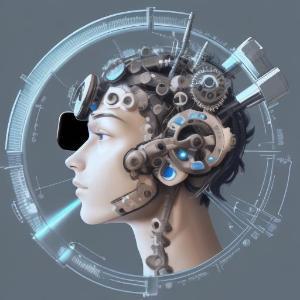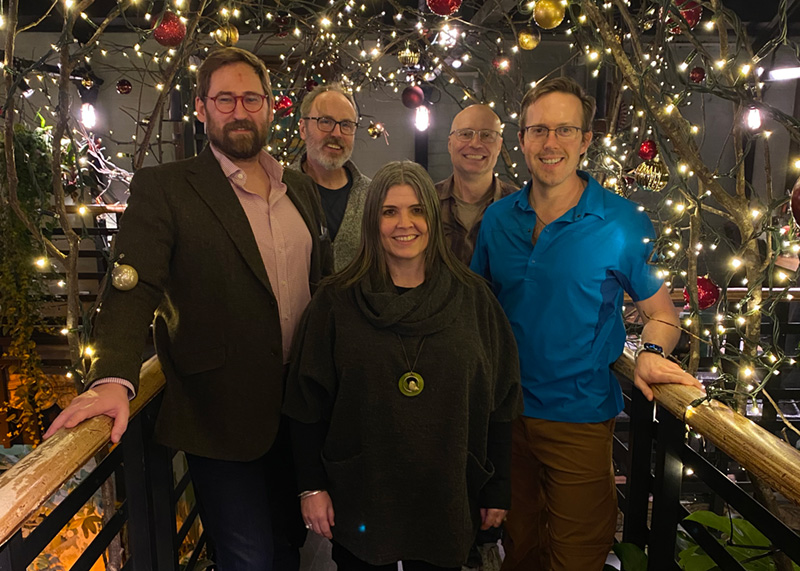Sensory Engineering: Investigating Altered and Guided Perception and Hallucination
 (AKA Project SENSOR)
(AKA Project SENSOR)
January 2024 - January 2027
Investigators:
Dr Derek Brown (PI, Glasgow)
Professor Sascha Benjamin Fink (PI, Friedrich-Alexander-Universität Erlangen-Nürnberg)
Professor Jack Lyons (Co-I, Glasgow)
Professor Fiona Macpherson (Co-I, Glasgow)
Postdoc:
Funding:
AHRC-DFG grant of approximately three quarters of a million pounds
Project Description
A range of new interventions on our sensory experiences will soon become commonplace in our society: Virtual and augmented reality, scientific sensory tools, sensory prosthetics, stroboscopic stimulation, psychedelic substances, and so on. These are all cases of “sensory engineering”. Consider what Carr et al. (2020) called “dream engineering”, where dream content is influenced by external stimulation, resulting in dreams with both hallucinatory and perceptual elements. Sensory engineering, more broadly, consists of any case in which sensations are altered or guided, with the intention of introducing new perceptual, illusory or hallucinatory elements into them.
In SENSOR, we study these interventions to develop a better philosophical understanding of the sensory experiences these new interventions provide, but also of ordinary sensory experiences. We aim to understand the wide range of perceptual and epistemic benefits that these technologies may offer and the related dangers that they may pose. Such dangers include increasing our biases, threatening our autonomy, compromising our capacity to act morally, and reducing our ability to know about the world by perceiving it.
Project SENSOR will achieve this goal by examining three foundational issues in the philosophy of perception: the nature of (1) illusion and hallucination, (2) direct and indirect perception, and (3) perceptual knowledge. It is essential to revisit these issues because the new sensory technologies offer up novel cases that force us to fundamentally reconsider them. As a result, we will have a better understanding of the old foundational issues but also of the new emerging sensory technologies and the possibilities that they afford us. The need for philosophical analysis and understanding of these cases—and thereby assessment of their potential uses, benefits, and harms—is pressing.
Details of our project conference are below.

From left to right: Sascha, Jack, Fiona, Derek and Brandon
Sensor Conference
22 - 24 April 2025, Erlangen, Germany
(Tentative) Schedule
TUESDAY 22nd
- 10:00–11:00 TALK 1.1:
- Presenters: Derek Brown & Sascha Fink:
- Title: Welcome: "What is Sensory Engineering" / RIP Special Issue
- 11:00–12:00 TALK 1.2:
- Presenter: Christopher Hill:
- Title: On a Misinterpretation of VR in Metaphysics, an Erroneous Conception of Its Role in Epistemology, and the Importance of Its Role in Vision Science.
- 12:00–13:30
- LUNCH
- 13:30–14:30 TALK 1.3:
- Presenter: Kevin Lande
- Title: TBD
- 14:30–15:30 TALK 1.4:
- Presenter: Elvira di Bona
- Title: TBD
- 15:30–16:00
- BREAK
- 16:00–17:00
- DEMONSTRATIONS OF SENSORY ENGINEERING
- 18:00-20:00 TALK 1.5: SENSOR PUBLIC LECTURE
- Presenter: Fiona Macpherson
- Title: TBD
- Location: TBD
- 20:00
- DINNER
WEDNESDAY 23rd
- 10:00–11:00 TALK 2.1:
- Presenter: Jonathan Cohen
- Title: VR and Object Perception: A Representational Account
- 11:00–12:00 TALK 2.2:
- Presenter: Jennifer Windt
- Title: A botanical metaphor for our wandering minds
- 12:00–13:30
- LUNCH
- 13:30–14:30 TALK 2.3:
- Presenter: Brandon Ashby
- Perceptual Syntax and the Limits of Sensory Extension
- 14:30–15:30 TALK 2.4:
- Presenter: Katalin Farkas:
- Title: Sensory engineering in a constructivist framework
- 15:30–16:00
- BREAK
- 16:00–17:00 TALK 2.5:
- Presenter: Vincent Müller
- Title: AI and Perception
- 17:00–18:00
- END DISCUSSION (EACH DAY ON ONE OF THE WP-THEMES)
- 18:30
- DINNER
THURSDAY 24th
- 10:00–11:00 TALK 3.1:
- Presenter: Paul Nordhoof
- Title: TBD
- 11:00–12:00 TALK 3.2: SENSOR
- Presenter: Aleksandra Mroczko-Wasowicz
- Title: TBD
- 12:00 - 13:30
- LUNCH
- 13:30–14:30 TALK 3.3:
- Presenter: Matej Kohar
- Title: Virtual Affordance Realism
- 14:30–15:30 TALK 3.4:
- Presenter: Robert Briscoe
- Title: TBD
- 15:30–16:00
- BREAK
- 16:00–17:00 TALK 3.5: SENSOR
- Presenter: Jack Lyons or Derek Brown
- Title: TBD
- 17:00–18:00
- END DISCUSSION (EACH DAY ON ONE OF THE WP-THEMES)
- 19:00
- DINNER
Key locations (link to Google Map list):
- Conference venue: Orangerie:
- Hotel: Bairischer Hof:

